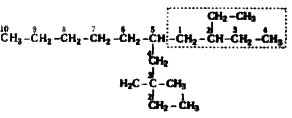Give the rule for IUPAC nomenclature for branched compounds. Explain with example
Text Solution
Branch containing alkane compounds are available in large amount. The nomination of such compounds are as follows:
Rule-1: First of all, the longest carbon chain in the molecule is identified. And this longest carbon chain is known as .Parent chain..
Example: In the example (I) given below, the longest chain has nine carbons and it is considered as the parent or root chain. Selection of parent chain as shown in (II) is not correct because it has only eight carbons.
(I) 1CH3−2CH∣CH3−3CH2−4CH2−5CH2−6CH∣C7H2C8H2−CH2−CH2−CH3 Parent chain is of 8 carbon
(II) 1CH3−2CH∣CH3−3CH2−4CH2−5CH2−6CH∣CH2CH3−7CH2−8CH2−9CH3Parent chain is of 9 carbon
so as per the rule -I parent chain of (II) is correct
Rule 2: The carbon atoms of the parent chain are numbered to identify the parent alkane and to locate the positions of the carbon atoms at which branching takes place due to the substitution of alkyl group in place of hydrogen atoms. The numbering is done in such a way that the branched carbon atoms get the lowest possible numbers:
(a) 1C−2C∣−3C−4C−5C−6C∣C−C−7C−8C−9C Started no. 1 from left end there is branching at carbon atom C2andC6
(b) 9C−8C∣−7C−6C−5C−4C∣C−C−3C−2C−1C
Thus, the numbering in the above example should be from left to right (branching at carbon atoms C2andC6) and not from right to left (giving numbers C4andC8 to the carbon atoms at which branches are attached).
Rule-3: The names of alkyl groups attached as a branch are then prefixed to the name of the parent alkane. The position of the substituents is indicated by the appropriate numbers. If different alkyl groups are present, they are listed in alphabetical order. Thus, name for the compound shown above is: 6-ethyl-2-methylnonane.
Note: The numbers are separated from the groups by hyphens and there is no break between methyl and nonane.
1CH3−2CH∣CH3−3CH2−4CH2−5CH2−6CH∣CH2CH3−7CH2−8CH2−9CH2
Note (i) According to parent longest carbon chain, it is nonane
(ii) The no .1 is taken at left side, the lowest get of locants become 2.
(iii) Base of alphabetical order methyl is written after or ethyl. The dash (-) is put between no. and words, and no space between nonane and prefixes i.e., become one word name.
Rule-4: If two or more identical substituent groups are present then the numbers are separated by commas.
The names ofidentical substituents are not repeated, instead prefixes such as di (for 2), tri (for 3), tetra (for 4) penta (for 5), hexa (for 6)etc. are used.
While writting the name of the substituents in alphabetical order, these prefixed, however, are not considered. Thus, the following compounds are named as:
(i) 1CH3−CH32∣CH−3CH2−CH34∣CH−5CH32, 4-Dimethylpentane
(ii) 1CH3−CH32∣C∣CH3−3CH2−CH34∣CH−5CH32, 2, 4-Trimethylpentane
(iii) 1CH3−2CH2−H3CH2C3∣CH−CH34∣C∣CH3−5CH2−6CH2−7CH33-Ethyl-4, 4-dimethylheptane
To indicate two same −CH3, put .di. and for position 2, 4-
The coma is present between 2 and 4
In (ii) coma is present between 2, 2,4-
In (iii), according to alphabet ethyl is after methyl but dimethyl (D) is not written first.
Rule-5: If the two substituents are found in equivalent positions, the lower number is given to the one coming first in the alphabetical listing. Thus, the example are:
(i) 1CH3−2CH2−3CH∣CH2CH3−4CH2−5CH2−6CH∣CH3−7CH2−8CH3Name: 3-ethyl-6-methyloctane
(ii) 8CH3−7CH2−6CH∣CH2CH3−5CH2−4CH2−3CH∣CH3−2CH2−1CH3or 6 ethyl-3-methyloctane
In (i) according to alphabet, methyl is come after ethyl and ethyl get less number.
∴ (i) is correct number and name.
Rule-6 : The branched alkyl groups can be named by following the above mentioned procedures. However, the carbon atom of the branch that attached to the root alkane is numbered 1 as exemplified below
4CH3−3CH∣CH3−2CH2−1CH∣CH3−
The name of such branched chain alkyl group is placed in parenthesis while naming the compound. While writing the trivial names of substituents. in alphabetical order, the prefixes iso- and neo-are considered to be the part of the fundamental name of alkyl group. The prefixes sec- and tert- are not considered to be the part of the fundamental name. The use of iso and related common prefixes for naming alkyl groups is also allowed by the IUPAC, nomenclature as long as these are not further substituted.
In multisubstituted compounds, the following rules may also be remembered:
if there happends to be two chains of equal size, then that chain is to be selected which contains more number of side chains. After selection of the chain, numbering is to be done from the end closer to the substituent
Example : (a) RIght order:  Name: 5-(2-Ethyl butyl) -3,3-dimethyldecane
Name: 5-(2-Ethyl butyl) -3,3-dimethyldecane
(b) Right order: 10CH3−9CH2−8CH2−7CH2−6CH2−5CH−4CH2−CH2−CH33∣CH−2CH2−1CH3 1| CH2 2| H2C−C−CH3 3| CH2−4CH3 Name: 5- (2, 2-Dimethylbutyl)-3-ethyldecane
In (a) and (b) both C6H13 substituent is with C5 and with all these longest chain with ten carbon is decane. As per (a) the order is correct, as substituent is at on least order 2 carbon. While in (b) order is 3.
|
Topper's Solved these Questions
- ORGANIC CHEMISTRY SOME BASIC PRINCIPLES AND TECHNIQUESBOOK - KUMAR PRAKASHANCHAPTER - ORGANIC CHEMISTRY SOME BASIC PRINCIPLES AND TECHNIQUESEXERCISE - Section A (Isomerism)
12 Videos
- ORGANIC CHEMISTRY SOME BASIC PRINCIPLES AND TECHNIQUESBOOK - KUMAR PRAKASHANCHAPTER - ORGANIC CHEMISTRY SOME BASIC PRINCIPLES AND TECHNIQUESEXERCISE - Section A (Fundamental Concepts in Organic Reaction Mechanism
10 Videos
- ORGANIC CHEMISTRY SOME BASIC PRINCIPLES AND TECHNIQUESBOOK - KUMAR PRAKASHANCHAPTER - ORGANIC CHEMISTRY SOME BASIC PRINCIPLES AND TECHNIQUESEXERCISE - Section A (Classification of Organic Compounds)
12 Videos
- HYDROGENBOOK - KUMAR PRAKASHANCHAPTER - HYDROGENEXERCISE - Section-D NCERT Exemplar (Long Answer)
8 Videos
- QUESTION ASKED IN JEE -2018BOOK - KUMAR PRAKASHANCHAPTER - QUESTION ASKED IN JEE -2018EXERCISE - MCQ
10 Videos
Similar Questions
Knowledge Check
What is the IUPAC nomenclature of the given compound?
 A5-Ethynyl-1, 6-heptadieneB3-Ethynyl-1, 6-heptadieneC3-Vinyl-hept-6-en-1-yneD5-Vinyl-hept-1-en-6-yne
A5-Ethynyl-1, 6-heptadieneB3-Ethynyl-1, 6-heptadieneC3-Vinyl-hept-6-en-1-yneD5-Vinyl-hept-1-en-6-yneWhat is the IUPAc nomenclature of the given compound ?
 A5-Ethynyl-hepta-1,6-dieneB3-Ethynyl-hepta-1,6-dieneC3-Vinyl hept-6-en-1-yneD5-Vinyl hept-1-en-6-yne
A5-Ethynyl-hepta-1,6-dieneB3-Ethynyl-hepta-1,6-dieneC3-Vinyl hept-6-en-1-yneD5-Vinyl hept-1-en-6-yne
What is the IUPAc nomenclature of the given compound ?

View SolutionIUPAC :nomenclature OF aromatic compounds,common names
View SolutionIUPAC : nomenclature OF compounds containing functional group
View SolutionIUPAC : IUPAC nomenclature OF organic compounds,hydrocarbons-alkanes
View SolutionIUPAC : nomenclature OF cyclo,bicyclo and spiro compounds
View SolutionExplain Hund's rule with an example .
View Solution
